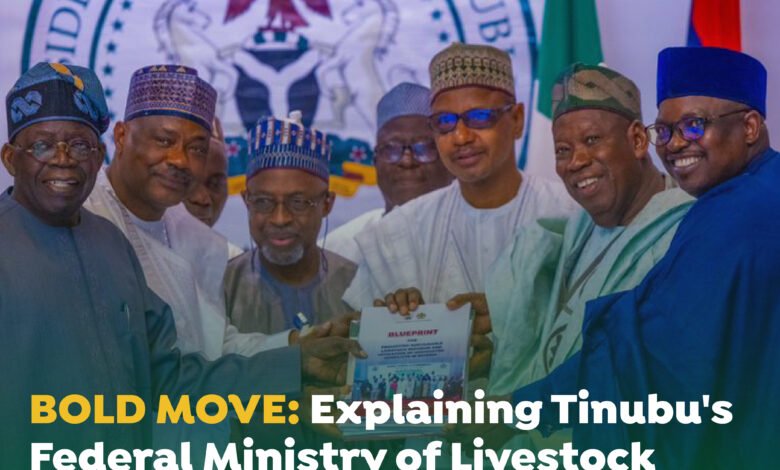BOLD MOVE: Explaining Tinubu’s Federal Ministry of Livestock Development Breakthrough

In a move hailed as long overdue, President Bola Tinubu announced a grand plan for the creation of the Federal Ministry of Livestock Development on Tuesday.
This bold step aims to address the persistent conflicts between farmers and herders in Nigeria.
The President made the announcement while inaugurating the Renewed Hope Livestock Reform Implementation Committee.
Background: A History of Conflict
Nigeria has grappled with persistent farmers and herders’ clashes, resulting in deaths, livelihood destruction, and food insecurity.
The conflicts stem from various factors, including governance, political, and social issues, rather than resource scarcity and climate change. Weak governance, land issues, poor relationships between groups, and ethnic bias have exacerbated the tension between farmers and herders.
The Committee’s Recommendations
The Presidential Committee on Livestock Reforms, established on September 15, 2023, submitted 21 recommendations to the President. The committee aims to reform the livestock industry and find sustainable solutions to the conflicts.
The national chairman of the All-Progressives Congress (APC), Abdullahi Ganduje, revealed that the President assured the committee that he would consider the recommendations.
“The report grew out of the urgent need to reform and develop the livestock industry, as well as provide solutions to the age-old conflicts between herders and farmers in Nigeria,” Abdullahi Ganduje said. “We recommended the establishment of the Ministry of Livestock and subsequent agencies so that various aspects of the recommendations would have appropriate institutions for implementation.”
A Ministry for Livestock Development
The creation of the Ministry of Livestock Development is a significant achievement for the President in addressing the conflicts. The ministry will bridge the institutional and regulatory gap, providing a robust legal and institutional approach to tackling the underlying issues.
The move is seen as a positive step towards resolving the protracted conflicts between farmers and herders.
Expert Insights
Analysts believe the ministry will adequately address the age-old conflicts between herders and farmers. According to Abdullahi Ganduje, “The establishment of the Ministry of Livestock and subsequent agencies will provide appropriate institutions for implementing the recommendations.”
Experts also believe that the ministry will address some of the country’s fault lines, particularly the farmer-herder relationship.
A Rowdy Session in the Senate
Recently, a bill for an act to establish a national animal husbandry and ranches commission sparked heated debates in the Senate.
While Senator Titus Zam (Benue North-West), who sponsored the bill, said it would nip the perennial conflicts between farmers and herders in the bud once and for all, stiff opposition from Senator Danjuma Goje (APC, Gombe Central) and Senator Adamu Aliero (PDP, Kebbi Central) turned the plenary into a high-decibel slanging match in the red chamber.
Not Everyone is Convinced
Laolu Akande, a former aide to ex-Vice President Yemi Osinbajo, expressed reservations about the need for a separate ministry. “I am not sure that we need a ministry [of livestock],” Laolu said on Monday’s edition of Channels Television’s Politics Today. “But let’s wait for more details.” He believes that the National Livestock Transformation Plan (NLTP), introduced by the previous administration, could effectively address the conflicts if implemented.
“The National Livestock Transformation Plan, if it is effectively implemented, is going to solve the problem of the farmer-herder clashes and is going to modernize the livestock industry in our country,” Laolu said
For many, the creation of the Federal Ministry of Livestock Development marks a significant step towards resolving the persistent conflicts between farmers and herders in Nigeria.
While some may have expressed reservations, experts widely see the move as a positive step towards addressing the institutional and regulatory gaps in the livestock industry.





